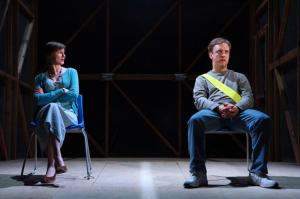There are three things you should know about Sam Mendes’ production of King Lear: it’s modern dress (more about it later), it achieves quite a few revelatory moments in the interpretation of the text (more about them later) and has a brilliant Lear in Simon Russell Beale. Maybe it’s true of King Lear what is true of Hamlet: it’s easier to have a brilliant central performance than having a brilliant production. If Sam Mendes’ King Lear falls short of true greatness, that’s more of an observation than criticism. The experience is rich and the rewards many, and any shortcomings become part of an intensely rich dialogue with the audience.
Simon Russell Beale’s Lear (short, with his head sunk in his body and quite reminiscent of Stalin in Collaborators) starts to show signs of deterioration early on. In the first scene, he has everyone under his thumb, unpleasant, mean, revengeful but his unstable mood picks through already. Did I miss the power of the king? I don’t think so. His bileful behaviour with Goneril in Act I, Scene IV is relentless and stomach-churning but underpinned with the abyss looking back. The moment he catches on – “O, let me not be mad, not mad, sweet heaven. Keep me in temper: I would not be mad!” – feels like an explosion, it creates a vacuum around him. Continue reading






